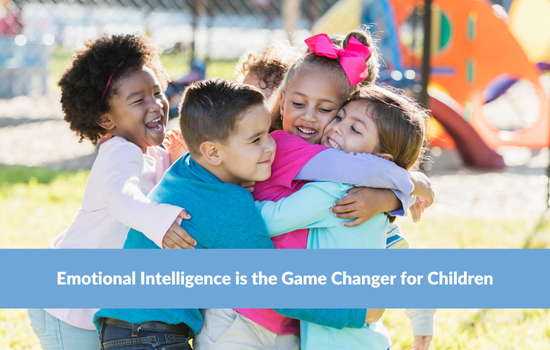As parents and caregivers, we strive to raise emotionally healthy children who reach their full potential and foster meaningful relationships. In today's rapidly changing world, nurturing emotional intelligence through social-emotional learning, self-regulation, empathy, resilience, and mindfulness practices has emerged as a genuine game changer, grounded not only in theory but also in growing scientific evidence.
The Silent Superpower: How Emotional Intelligence Empowers Children

Why Emotional Intelligence Matters More Than Ever
Advancing emotional intelligence isn't just a feel-good goal; it's one of the strongest predictors of mental health, social outcomes, and adaptive coping in children. Studies have shown that children with better self-regulation and emotional awareness tend to score higher in social competence, academic engagement, and resilience. For example, emotional intelligence has been found to moderate the relationship between self-regulation and resilience in adolescents. (Source: ResearchGate)
Moreover, physical activity and movement can enhance both emotional intelligence and resilience, thereby contributing positively to a child's overall emotional well-being. (Source: PubMed Central)
Our Children: Emotional Intelligence = Game Changer
We must intentionally support children by embedding emotional intelligence into their daily lives. It's not enough to promote their intellectual skills—children need to learn how to identify, express, and regulate their emotions so they can build strong relationships and adapt during challenges.
Children Need to Become Aware of Their Emotions
Emotional awareness is foundational. It gives children the vocabulary and insight to understand their feelings of anger, sadness, confusion, or frustration. Without this awareness, it's difficult for them to regulate responses or empathize with others. In fact, neuroscientists have long observed that the brain regions responsible for emotional control mature later than those involved in emotional reactivity, making scaffolding and guidance essential in the early years. (Source: Early Years TV)
Parental Impact on Relationships
The connection between parents and children is central to emotional development. Children learn from how their parents interpret and handle emotions, and these patterns teach them implicit rules about feelings. When parental models are emotionally intelligent, expressing vulnerability, adjusting responses, and co-regulating with children, they foster a child's ability to mirror empathy, regulate stress, and build strong interpersonal skills.
In research on caregiving, emotional intelligence frameworks that incorporate self-regulation and cognitive flexibility have been associated with greater resilience in high-stress family environments. (Source: MDPI)
Allow Your Children to Experience Their Emotions
At home, where children feel safe and accepted, is often where intense emotional reactions surface. Rather than suppressing meltdowns or emotional outbursts, caregivers should use these moments as openings: help children label their feelings, pause and breathe (a simple mindfulness tool), and reflect on what triggered them.
Creating a calm, consistent environment helps children gradually internalize self-regulation and resilience practices. When kids realize that emotions aren't bad or shameful, they become safer in exploring and learning to manage them.
Emotional Intelligence Leads to Better Learning, Relationships, and Resilience
Children who develop strong emotional intelligence are better equipped for academic and social success. As John Gottman put it:
"A child with a high emotional IQ … understands and relates well with others and can form strong friendships more easily than a child with a lower emotional IQ."
According to Cornell University, in recent years, innovations in social-emotional learning (SEL) and robotic or AI-mediated interventions have been piloted to encourage emotional literacy, empathy, and self-awareness in children.
By reinforcing emotional intelligence, you support not only momentary emotional control but also lifelong resilience—a child's capacity to bounce back from setbacks, manage stress, and adapt in changing circumstances.
Practical Tips for Raising Emotionally Intelligent Kids
Below are some effective strategies you can implement:
-
Model emotional awareness and self-regulation. Narrate your own feeling processes: "I'm frustrated by this traffic—so I'm going to take three deep breaths."
-
Narrative reflection. Use storytelling or prompts (e.g. "What happened? How did that make you feel? What helped you calm down?") to deepen emotional insight.
-
Mindfulness and breathing practices. Simple breathing exercises or guided body scans can help children (and adults) pause, notice emotion, and choose responses.
-
Emotion coaching. Rather than dismissing strong feelings, acknowledge them, validate them, and partner with the child in finding strategies to cope.
-
Encourage empathy through perspective-taking. Ask children to imagine how someone else might feel or reflect on different emotional cues.
-
Use structured SEL activities. Apps, games, books, or even AI tools are being developed to scaffold emotional vocabulary, self-reflection, and emotional reappraisal.
-
Promote autonomy within support. Give children space to try emotional regulation strategies themselves (guided gradually) so they internalize the skills.
Emotionally Intelligent Children Thrive
Emotional intelligence is no longer a "nice add-on"—it's central to children's wellbeing, academic success, social connections, and adaptive resilience. By integrating social-emotional learning, self-regulation, empathy, mindfulness, and resilience into everyday moments, caregivers can have a profound impact on how children navigate life's challenges.
When you help your child first recognize their emotions, then name them, and then regulate them, you're giving them a lifelong advantage. Emotional intelligence truly is the game-changer. For readers interested in exploring emotional development and mindset further, consider the chapter "Raising Emotionally Intelligent Children" in my book, The Power of Emotion.
This article was originally published on May 27, 2017, and has been updated (October 2025).
More Motivational Reads Here »
How Emotionally Intelligent Are You?
Sign up for Linda's monthly tips to build your Emotional Intelligence and reduce Emotional Hijacking!

















